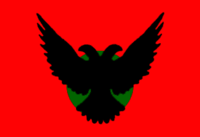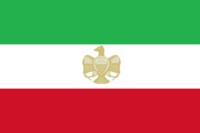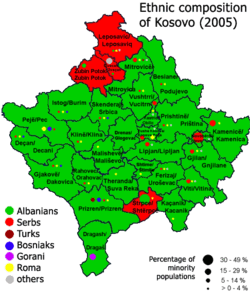Ashkali and Balkan Egyptians
The Ashkali (also Aškalije, Haškalije, Hashkali) and Balkan Egyptians (Jevgs, Egjiptjant or Gjupci) are Albanian-speaking ethnic cultural minorities (recognized communities) which mainly inhabit Kosovo. They are sometimes considered to be Albanized Romani, but they do not self-identify as such. Prior to the Kosovo War of 1999, Ashkali registered themselves as Albanians.[9]
| Regions with significant populations | |
|---|---|
| 26,960[1][lower-alpha 1] | |
| 3,713[2][lower-alpha 2] | |
| 3,368[3][lower-alpha 2] | |
| 2,831[4][5][lower-alpha 3] | |
| 2,054[6][lower-alpha 2] | |
| 172[7] | |
| Languages | |
| Albanian | |
| Religion | |
| Predominantly Muslim (Sunni and Bektashi) Orthodox Christian minority[8] | |
During the Kosovo War, they were displaced as refugees in Albania, Serbia and North Macedonia and whole Western Europe such as Germany and France. The "Ashkali" identity was created in 1999, as they tried to show their pro-Albanian stance and distinguish themselves from the Roma (Gypsies).[10]
History
The "Ashkali" have been classed as a "new ethnic identity in the Balkans", formed in the 1990s.[11]
It was earlier applied to stationary Roma who settled in Albanian areas during Ottoman Empire times. The Ashkalija speak Albanian as their first language. Ashkalija often worked as blacksmiths, or manual laborers on Ottoman estates. Ashkalija are found mainly in eastern and central Kosovo. The Ashkali people claim that they have originated in Persia, now Iran, in 4th century BC (Ashkal, Gilan, Iran); however, there are no indicators for this hypothesis and it not scientifically proven. There are other theories of the Ashkali coming from Turkey in a village called Aşkale (Erzurum district of Turkey), or possibly have come from ages ago in the city of Ashkalon (Israel). Still, some believe they are travelers from Northern India (Romani) who have used the Albanian language as their mother-tongue.
A 14th-century reference to a placename (Агѹповы клѣти, Agupovy klěti) in the Rila Charter of Ivan Alexander of Bulgaria is thought to be related to the Balkan Egyptians according to some authors, such as Konstantin Josef Jireček.[12][13]
In 1990, an "Egyptian association" was formed in Ohrid, Macedonia. During the Kosovo War, Albanized Roma were displaced as refugees in Albania and the Republic of Macedonia. Many Ashkali fought in the Kosovo Liberation Army. Albanized Roma formed the ethnic group Ashkali after the end of the war in 1999, to show their pro-Albanian stance and distinguish themselves from the Roma, who had been mistakenly viewed as pro-Serbian during the war. Many Albanized Roma were also sent to refugee camps with other Roma, with whom they did not share the same language and customs.[9] As the majority of Kosovo (or Albanized) Roma, many Ashkali refugees settled in Serbia and Montenegro. The first Ashkali party (Democratic Party of the Ashkali Albanians of Kosovo) was formed in 2000 under Sabit Rrahmani, who supported Kosovo independence in the name of all Ashkali.[9]
In Kosovo, the Ashkali were aligned with Albanians before, during and after the Kosovo War.[9] However, Ashkali, along with Romani Gypsies from Kosovo, have reportedly been expelled from the area.[14]
Demographics
Most Ashkali and Egyptians live in Kosovo and North Macedonia, but the peoples also reside in Albania, Serbia and Montenegro. In the Macedonian census of 2002, 3,713 people self-identified as "Egyptian". In the Serbian census of 2002 (excluding Kosovo), 814 people self-identified as "Egyptian". In the Montenegrin census, 225 people self-identified as "Egyptian".
Ashkali are predominant in the central and eastern regions of Kosovo: Ferizaj, Fushë Kosova and Lipjan. Egyptians live in western Kosovo: in Gjakova, Istog, Peja and Deçan. The Ashkali/Egyptian community of Kosovo had 98% unemployment in 2009.[15]
Culture

Roma, Ashkali, and Egyptians claim ethnic differences among them. Marriages between Egyptians and Albanians are very rare but still more frequent than marriages between Romani and Albanians, while marriages between Egyptians with Roma are extremely rare. Roma and Ashkalija do not classify one another as Gadje.[15] The Ashkali and Roma claim the Egyptians as their own; whereas the Ashkali and Egyptians dispute over each other's background.[9] No television or radio channels are dedicated to Askhali or Egyptian minority audiences.[15]
References
- 15,436 Ashkali and 11,524 Balkan Egyptians
- Identified as Balkan Egyptians
- 1,834 Balkan Egyptians and 997 Ashkali at the 2011 census
- "Population - by gender ethnicity at settlement level" (PDF). p. 11. Retrieved 31 July 2019.
- Statistički godišnik na Republika Makedonija (in Macedonian). 2007. p. 55. Retrieved 31 July 2019.
- "1.1.13 Popullsia banuese sipas përkatësisë etnike dhe kulturore sipas Përkatësia etnike dhe kulturore, Variabla dhe Viti" (xls). INSTAT - Instituti i Statistikave (in Albanian). Retrieved 30 July 2019.
- "Попис становништва, домаћинстава и станова 2011. у Републици Србији" (PDF) (in Serbian). Statistics of Serbia. Archived from the original (PDF) on 14 June 2017. Retrieved 31 July 2019.
- "THIRD REPORT SUBMITTED BY SERBIA PURSUANT TO ARTICLE 25, PARAGRAPH 2 OF THE FRAMEWORK CONVENTION FOR THE PROTECTION OF NATIONAL MINORITIES". Council of Europe. p. 14-15. Retrieved 31 July 2019.
- "STATISTIČKI GODIŠNJAK 2011" (PDF). Statistics of Montenegro: 46. Retrieved 31 July 2019. Cite journal requires
|journal=(help) - "1. POPULATION BY ETHNICITY – DETAILED CLASSIFICATION, 2011 CENSUS". Croatia Bureau of Statistics. 31 January 2012. Retrieved 20 June 2018.
- Nielsen, Jørgen; Akgönül, Samim; Alibašić, Ahmet; Racius, Egdunas, eds. (2013). Yearbook of Muslims in Europe, Volume 5. BRILL. p. 370. ISBN 9789004255869.
- Valeriu Nicolae; Hannah Slavik (2007). Roma Diplomacy. IDEA. ISBN 978-1-932716-33-7.
- Elsie, Robert (15 November 2010). "Historical Dictionary of Kosovo". Scarecrow Press – via Google Books.
- ""NEW ETHNIC IDENTITIES IN THE BALKANS: THE CASE OF THE EGYPTIANS"" (PDF). Facta.junis.ni.ac.rs. Retrieved 15 October 2017.
- Даскалова, Ангелина; Мария Райкова (2005). Грамоти на българските царе (in Bulgarian). София: Академично издателство "Марин Дринов". p. 57.
- Trubeta, Sevasti (March 2005). "Balkan Egyptians and Gypsy/Roma Discourse" (PDF). Nationalities Papers. 33 (1): 71–95. doi:10.1080/00905990500053788.
- Memorandum of the Society for Threatened People on the Issue of Lead Poisoning of Roma in IDP Camps in Kosovo, GFBV.
- "Notes made from the Ashkali and Egyptian communities for the shadow report on the Implementation of the Framework Convention for the Protection of National Minorities in Kosovo" (PDF). Minelres.lv. Retrieved 15 October 2017.
- "Archived copy". Archived from the original on 2016-01-09. Retrieved 2015-12-26.CS1 maint: archived copy as title (link)
- Abedin Toplica: "Flamuri Kombëtar i Ashkalive / Zastava Aškalija / The National Flag", Ashkali Horizonti, nr. 2, 2003 www.ashkali.org.yu "The flag is red with a black rising eagle in front of a green disk. The red and black color are similar to the Albanian flag. The green disk represent[s] Islam"
Footnotes
| a. | ^ Kosovo is the subject of a territorial dispute between the Republic of Kosovo and the Republic of Serbia. The Republic of Kosovo unilaterally declared independence on 17 February 2008, but Serbia continues to claim it as part of its own sovereign territory. The two governments began to normalise relations in 2013, as part of the 2013 Brussels Agreement. Kosovo is currently recognized as an independent state by 97 out of the 193 United Nations member states. In total, 112 UN member states recognized Kosovo at some point, of which 15 later withdrew their recognition. |
Cited works
- Dragan Novaković, Potomci faraona u Srbiji, DT Magazin, 4. April 1998.
- Marushiakova, Elena; Heuss, Herbert; Boev, Ivan; Rychlik, Jan; Ragaru, Nadege; Zemon, Rubin; Popov, Vesselin; Friedman, Victor (2001). Identity Formation among Minorities in the Balkans: The cases of Roms, Egyptians and Ashkali in Kosovo (PDF). Sofia: Minority Studies Society, Studii Romani.
External links
- Gypsy Blood: The Roma, Ashkali and Egyptian IDPs of Mitrovica, Kosovo, 2005
- TV Debate with Ashkali and Egyptian Community Members (in Albanian), ECMI Kosovo (Youtube channel), February 12, 2013
- NEW ETHNIC IDENTITIES IN THE BALKANS: THE CASE OF THE EGYPTIANS
- Differences of prejudices and collective blames toward to the Balkan’s Egyptians
- Egjiptianëve Kosovarë
- Union of Balkan's Egyptians
- The New Democratic Initiative of Kosovo (Iniciativa e re Demokrarike e Kosovës)
- New Democratic Initiative of Kosovo, based in Switzerland
- Minority Rights Group
- Ashkali flag at FAME

